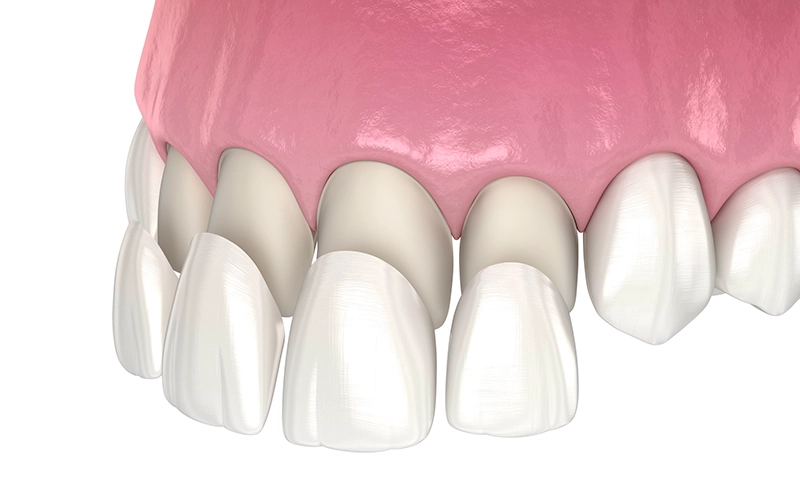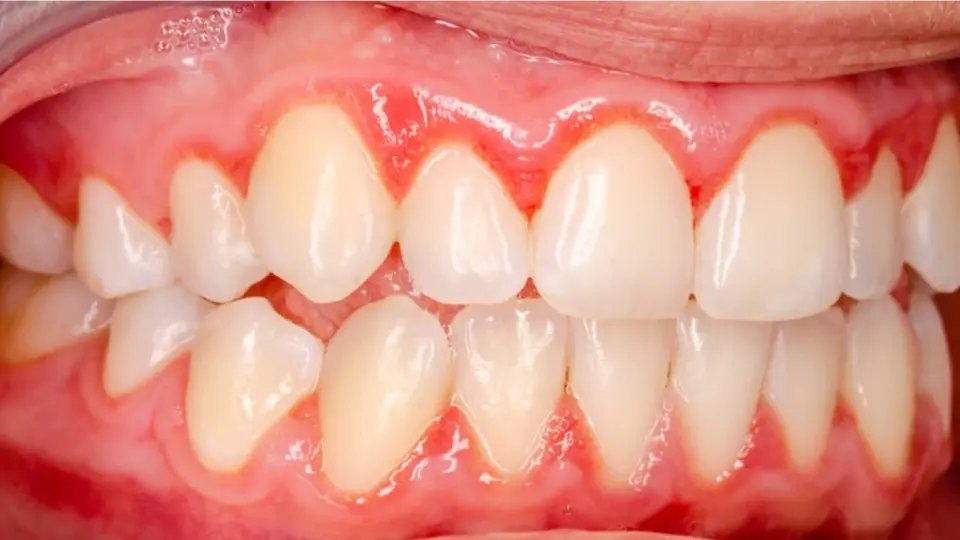If you’ve ever looked in the mirror to see a little bit of red on your toothbrush or experienced sore gums that are tender to the touch, it’s likely that you have some form of gum disease.
Gum disease or periodontal disease affects millions of Americans and ranges from mild (gingivitis) to severe (advanced periodontitis). While gum diseases can significantly compromise both oral hygiene and overall health if left untreated, they are also treatable conditions with simple treatments like improved dental hygiene habits and antibiotics.
In this blog post, we’ll go through what causes bleeding gums along with all the treatments available—from when to do a DIY solution at home to when it might be best for you to visit the dentist!
Why do gums bleed when brushing?
Gingivitis
Gums can bleed when brushing due gingivitis, which is the initial stage of gum disease, is a disorder that is present in the mouth. When plaque, a sticky film containing bacteria, accumulates along the gumline, it irritates the gums, leading to inflammation. This inflammation makes the gums more prone to bleeding, especially when brushed or flossed.
Too Much Brushing
Aggressive brushing techniques can also contribute to bleeding gums. Using excessive pressure or a toothbrush with hard it is possible for bristles to cause harm to the gum tissue, which is fragile, resulting in bleeding. Using a toothbrush with soft bristles and applying gentle, circular motions while brushing is important to avoid injuring the gums.
Other factors contributing to bleeding gums during brushing include:
- variations in hormone levels (such those that occur after pregnancy)
- vitamin shortages (particularly vitamin C and K)
- certain medications that affect blood clotting
Addressing the underlying cause of bleeding gums is crucial to prevent further damage and progression of gum disease. The practice of good dental hygiene, which includes brushing, flossing, and flossing on a regular basis, having your teeth cleaned on a regular basis can help eliminate plaque and reduce gum inflammation.
If bleeding gums persist despite these efforts, it is important to consult a dentist for a thorough evaluation and appropriate treatment.
Can bleeding gums be a sign of gum disease?
It is possible that gum disease, more specifically gingivitis, is the cause of bleeding gums.Gingivitis is an early stage of gum disease characterized by inflammation of the gums.
While plaque builds up on teeth, it takes the form of a sticky film. Plaque can irritate and inflame the gums along the gumline, causing them to become red, swollen, and prone to bleeding, particularly while brushing or flossing. Plaque is a bacterial film that collects on teeth and has the appearance of a sticky film.
Reversing gingivitis is possible in the majority of instances practicing good oral hygiene and seeking expert dental care. However, if gingivitis is not treated, periodontitis, a more serious form of gum disease, can develop if the condition is not treated.
Periodontitis is a condition that can result in gum recession, tooth loss, and other major oral health problems. Therefore, it’s crucial to address bleeding gums promptly and seek dental attention to prevent the advancement of gum disease.
How to treat bleeding gums at home
Treating bleeding gums at home can be an initial step to address the issue, but for a proper examination, it is necessary to contact a dentist evaluation and treatment plan. Here are some home care tips for managing bleeding gums:
- Proper Oral Hygiene: Brush your teeth gently but thoroughly twice a day using a soft-bristle toothbrush and fluoride toothpaste. Be gentle to avoid further irritation.
- Floss Regularly: Flossing daily helps remove plaque and debris from the spaces between the teeth as well as the areas along the gumline. To avoid snapping the floss, gently glide it back and forth.
- Rinse with Saltwater: Rinse your mouth after flossing and brushing, rinse your teeth with a warm saltwater solution (half a teaspoon of salt in eight ounces of warm water). By doing so, you can lessen swelling and speed up the healing process.
- Use Antiseptic Mouthwash: An antiseptic or antimicrobial mouthwash may help reduce bacteria in the mouth. Consult your dentist for recommendations.
- Avoid Tobacco: When people smoke or use tobacco products, they exacerbate gum problems. Quitting or avoiding these products is essential for gum health.
- Maintain a Balanced Diet: Eat a diet packed with healthy produce and minimally sweet snacks and beverages. Nutrients like vitamin C can promote gum health.
- Stay Hydrated: Keeping hydrated by drinking lots of water helps keep oral moisture and can aid in preventing gum irritation.
While these home care tips can help alleviate mild cases of bleeding gums, it’s crucial to see a dentist for a comprehensive evaluation and professional treatment. Persistent or severe bleeding gums may indicate an underlying issue like gum disease, which requires professional intervention for effective management and prevention of complications.
When is it necessary to see a dentist?
It is necessary to see a dentist for various reasons to maintain good oral health. At least once every six months, it is recommended to get regular dental checkups for preventive care.
However, there are specific situations when it becomes even more crucial to schedule an appointment with a dentist. These include:
- persistent tooth pain or sensitivity
- bleeding gums
- swollen or tender gums
- loose teeth
- bad breath
- mouth sores that do not heal
- jaw pain or clicking
- difficulty chewing or swallowing
- alterations in the way the teeth or gums look for the patient
Additionally, if you have dental restorations such as fillings or crowns that are damaged or broken, appropriate dental care should be sought out as soon as possible. Any sudden or severe dental issues or accidents, such as a knocked-out tooth or a broken jaw, also require immediate attention from a dentist. Regular dental visits and timely intervention can help dental disorders should be identified and treated as soon as possible to avoid future consequences and ensure optimal oral health.
Are there preventive measures for gum bleeding?
Yes, there are preventive measures that can help reduce the risk of gum bleeding. The most important step is maintaining good oral hygiene. This involves using fluoride toothpaste to brush your teeth and flossing your teeth to remove plaque and bacteria that cause gum disease
Be sure to gently brush along the gumline so as to eliminate plaque and bacteria that can lead to gum disease inflammation and bleeding. Regular flossing or using interdental brushes is also essential for cleaning between the teeth and along the gumline.
In addition to oral hygiene practices, it is vital to have a vitamin-rich, balanced diet as vitamin C and K deficiencies can cause gum bleeding. Reducing tobacco and alcohol use can also help promote healthy gums.
Preventative dental care cannot be overstated and requires regular expert cleanings and examinations. For the purpose of avoiding cavities and other oral health issues from getting worse, it’s important to see a dentist regularly for checkups.
By following these preventive measures and maintaining good oral hygiene practices, you can significantly reduce the risk of gum bleeding and maintain optimal gum health.
Having Problem With Bleeding Gums? It’s Time to See a Dentist!
Paradise Dental Studio‘s dedicated team is committed to guiding residents through personalized preventive oral care. We empower our patients to foster long-term gum health by focusing on effective oral hygiene, regular check-ups, a balanced diet, tobacco avoidance, and stress management.
Trust us for comprehensive dental care that prioritizes prevention and promotes lasting well-being in the Fort Lauderdale community. Contact us for more information!


